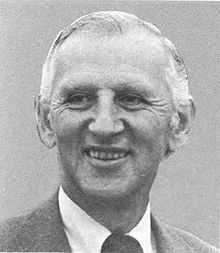Sidney R. Yates
| Sidney R. Yates | |
|---|---|
 | |
| Member of the U.S. House of Representatives from Illinois's 9th district | |
| In office January 3, 1949 – January 3, 1963 January 3, 1965 – January 3, 1999 | |
| Preceded by | Robert Twyman Edward R. Finnegan |
| Succeeded by | Edward R. Finnegan Jan Schakowsky |
| Personal details | |
| Born | August 27, 1909 Chicago, Illinois |
| Died | October 5, 2000 (aged 91) Washington, D.C. |
| Political party | Democratic |
| Religion | Jewish |
Sidney Richard Yates (August 27, 1909 – October 5, 2000) was a politician from the state of Illinois.
Yates was born in Chicago, Illinois and he graduated from the University of Chicago. He served in the United States Navy during World War II.
Career in Congress
From 1949 to 1963 and 1965 to 1999, Yates served in the House of Representatives as a Democrat. Although the boundaries of his district changed over the years, it was invariably centered on the lakefront wards of Chicago.
During the late 1950s, after a series of lurid magazine articles and Hollywood films helped to sensationalize youth gangs and violence, Yates called for legislation to ban automatic-opening or switchblade knives, proclaiming that "Vicious fantasies of omnipotence, idolatry...barbaric and sadistic atrocities, and monstrous violations of accepted values spring from the cult of the weapon, and the switchblade knife is included in this. Minus switchblade knives and the distorted feeling of power they beget--power that is swaggering, reckless, and itching to express itself in violence--our delinquent adolescents would be shorn of one of their most potent means of incitement to crime."[1][2][3] The ban on switchblade knives was eventually enacted into law as the Switchblade Knife Act of 1958.[3] Rep. Yates and other congressmen supporting the Switchblade Knife Act believed that by stopping the importation and interstate sales of automatic knives (effectively halting sales of new switchblades), the law would reduce youth gang violence by blocking access to what had become a symbolic weapon.[1][3][4] However, while switchblade imports, domestic production, and sales to lawful owners soon ended, later legislative research demonstrated that youth gang violence rates had in fact rapidly increased, as gang members began using firearms instead of knives.[5]
Yates was an unsuccessful candidate for the United States Senate in 1962 against Republican incumbent and Senate Minority Leader Everett Dirksen. He briefly served at the U.N. before returning to the House after the 1964 election. Yates served on the Appropriations Committee throughout his career and chaired the Interior Subcommittee from 1975 to 1995. On this committee he supported environmental programs and the National Endowment for the Arts.
Yates remained on good terms with liberal reformers and machine politicians in Chicago throughout his career. He also served on the Foreign Operations subcommittee and was a strong advocate of American support for Israel. He worked hand-in-hand with his chief of staff, Mary Bain, to preserve federal funding for the arts and for Natural Heritage Preservation programs, and to establish the U.S. Holocaust Memorial Museum.
In 1993, he was presented with the Presidential Citizens Medal by President Clinton. In 1999, the Auditors Building in Washington, DC, was renamed the Sidney Yates Building in his honor.[6]
In his closing months of service, he surpassed Robert L. Doughton as the oldest person ever to serve in the House (Yates was surpassed in this record by Ralph Hall (R-Texas) in 2012). He holds the record as the 10th longest-serving member in the history of the US Congress, and also has the longest tenure of all members whose time in Congress was interrupted at some point.
Awards and Honors
In 1997 he received the Four Freedom Award for Freedom of Speech[7]
Notes
- ↑ 1.0 1.1 Levine, Bernard R., The Switchblade Menace, OKCA Newsletter (1993)
- ↑ Knife World (August 1990)
- ↑ 3.0 3.1 3.2 Switchblade Knives: Hearing, House Committee on Interstate and Foreign Commerce, Eighty-fifth Congress, Minutes of the Second Session, April 17, 1958
- ↑ Knife World Magazine (August 1990)
- ↑ Clark, Charles S., Youth Gangs Worsening Violence Prompts Crackdowns and Community Mobilization, Congressional Quarterly 1, 11 October 1991, pp. 753-776
- ↑ Histories of the USDA Headquarters Complex Buildings, U.S. Department of Agriculture Departmental Management website, accessed July 28, 2011
- ↑ http://www.rooseveltinstitute.org/four-freedoms-awards
References
- Sidney R. Yates at the Biographical Directory of the United States Congress
- Statement on the Death of Representative Sidney R. Yates at the Wayback Machine (archived May 11, 2010)
| United States House of Representatives | ||
|---|---|---|
| Preceded by Robert J. Twyman |
Member of the U.S. House of Representatives from Illinois's 9th congressional district January 3, 1949 – January 3, 1963 |
Succeeded by Edward R. Finnegan |
| Preceded by Edward R. Finnegan |
Member of the U.S. House of Representatives from Illinois's 9th congressional district January 3, 1965 – January 3, 1999 |
Succeeded by Jan Schakowsky |